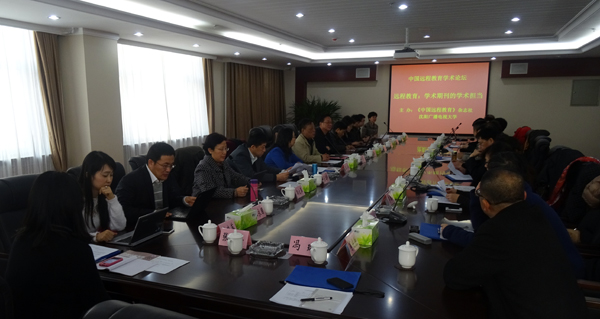 On March 7, 2015, the China Distance Education Academic Forum (hereinafter referred to as the Forum) met to discuss the theme: "Distance Education: Responsibilities of Academic Journals" in Shenyang, Liaoning Province. The Forum was jointly hosted by Distance Education in China and Shenyang Radio and TV University (RTVU).
On March 7, 2015, the China Distance Education Academic Forum (hereinafter referred to as the Forum) met to discuss the theme: "Distance Education: Responsibilities of Academic Journals" in Shenyang, Liaoning Province. The Forum was jointly hosted by Distance Education in China and Shenyang Radio and TV University (RTVU).
Experts and scholars from Peking University, Beijing Normal University, Beijing University of Posts and Telecommunication, South China Normal University, East China Normal University, Central China Normal University, Shanghai Normal University, Zhejiang University of Technology, the University of Hong Kong, Jiangsu Open University, Shanghai Open University, Anhui RTVU, Jiangxi RTVU, Heilongjiang RTVU, Shantou RTVU, periodicals such as Education Research, China Higher Education Research, Peking University Education Review, the Information Centre for Social Sciences, and Renmin University of China, were invited to share their views.

The Forum mainly focused on the following topics: In respect to the function of academic journals in the field of education and their role in research and publication, what unique roles do they play? How can distance education academic journals form their own characteristics in academic pursuits? In order to promote and lead in the academic research and practice field, what efforts should the academic journals make in multiple dimensions, such as the dimensions of content and methodology, etc.? Which problems should academic journals in the distance education field focus on with regard to the dimensions of content and methodology? How can these journals promote the construction of a healthy and lively academic ecology? What is the status quo of the evaluation index and evaluation system for the academic journals and academic researches? What are the prominent features of the academic assessment of distance education? How to play a positive role?
Attending scholars agreed that distance education academic journals should exert their roles in academic communication, academic criticism, and academic guidance, which is expected from an academic platform. Through appropriate mechanisms and initiatives, they should encourage the production and dissemination of original academic thoughts as well as encouraging the tracing and analysis of frontier subjects and promoting a scientific and strict attitude towards scientific methodology. Academic journals should have both an international vision and promote the establishment of China's system of academic discourse. Scholars also pointed out that the distance education academic journals should stick to their academic nature and adhere to academic standards. They should manifest and continue to improve the scholarly quality of academic journals in the dimensions of content and methods, and promote the construction and development of disciplines in distance education. Scholars said that the development of the Internet and information technology has brought about rapid changes in academic expressions and the modes of transmission. Academic journals must improve their comprehensive ability to adapt and respond to the new forms and trends of the academic ecological circle.
Mr. Yan Bing, Vice President of the Open University of China (OUC) and Chief Editor of Distance Education in China pointed out in his statement in the forum that attention should be given to: how academic journals are used to display, affect, or even, to some degree, instruct the process of practice, exploration, and theory research in distance education and to establish a platform for effective communication among practitioners, researchers, and managers; how academic journals can play an active role in the formation and development of the disciplines and the unique problems existing in China; and how to promote the formation of a healthy academic ecology and to carry out lively academic criticism and debate. He also said that attention should be paid to the profound impact that the application of information technology has on the development of academic journals. He suggested the benefits of research into subjects relevant to the business status of digital academic journals and the promotion of relevant research. Finally, he said that the forum should focus on the internationalization of academic periodicals, make sound decisions and take corresponding initiatives, thus focusing on the formation and improvement of comprehensive academic publications.
Vice President of the OUC, General Manager of the OUC Publishing and Media Group, Mr. Liu Chen briefed the participants on the basic information and the layout of the core businesses of educational publication and academic publications of the group. He said that the OUC Publishing and Media Group will give full play to the advantage of distance education, integrate the business relationship of academic journals and academic books, and vigorously develop an academic publishing base with its own distinctive features.
Mr. Wang Bin, President of Shenyang RTVU, addressed the Forum, while his superior, Mr. Yin Xunfa, Secretary of Party Committee, attended the Forum. Forum discussions were presided over by Vice President of Shenyang RTVU, Mr. Zhou Donghui, President of Distance Education in China, Mr. Zhao Wei and Editor-in-chief, Ms.Feng Lin.
Since the periodical was reformed in 2000, Distance Education in China, in order to advance academic publication, demonstrate publishing features, and provide services for the development process of open and distance education, has carried out explorations and practices in multiple levels and disciplines. Currently, academic publications, including academic journals, have become an important part of the business model of the OUC Publishing and Media Group. Over the 15 years since the periodical was reformed, Distance Education in China continues to focus on the responsibilities which are incumbent upon academic journals, to build a broader platform for publication, and to continue to explore new means to improve its academic quality and level.
By Hao Dan, the OUC